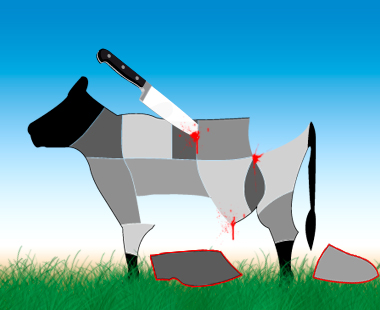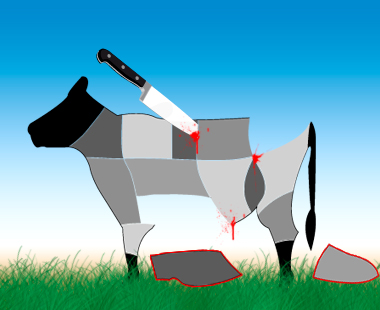 It’s death by a thousand cuts for small-farm Bessie.Photo: Wade FasanoLate on Thursday, the House of Representatives passed the Department of Agriculture’s appropriations bill for the next fiscal year. In their zeal to slash spending, House Republicans approved $7 billion less for the department than President Obama requested, cuting out worldwide hunger programs, settlement payments to Brazilian cotton farmers, and a popular “Know Your Farmer, Know Your Food” initiative that connected local farmers with their schools and other food programs in their communities.
It’s death by a thousand cuts for small-farm Bessie.Photo: Wade FasanoLate on Thursday, the House of Representatives passed the Department of Agriculture’s appropriations bill for the next fiscal year. In their zeal to slash spending, House Republicans approved $7 billion less for the department than President Obama requested, cuting out worldwide hunger programs, settlement payments to Brazilian cotton farmers, and a popular “Know Your Farmer, Know Your Food” initiative that connected local farmers with their schools and other food programs in their communities.
But a tiny $2 million cut might hurt small farmers the most. The bill also stops the USDA from finishing an effort that would help small farmers who contract with big meatpacking companies like Tyson, Smithfield and Cargill. It blocks the Grain Inspection, Packers and Stockyards Administration (GIPSA), which would have gotten that $2 million boost under Obama’s requested budget, from using any money to finish a three-year-long effort to rewrite the rules that govern grain and meat markets. Those final rules were due to be issued soon, and putting the process on hold doesn’t have anything to do with cutting the deficit. “The GIPSA rule doesn’t really cost very much money, and cutting doesn’t save much,” says Patty Lovera of the watchdog group Food and Water Watch.
The rule-change effort was a small but key step in reforming the American meat industry, which exploits farmers and foists increasingly unsafe meat onto consumers. In the 2008 farm bill, Congress gave GIPSA, which is charged with regulating the grain and livestock markets, the power to revise and modernize the 100-year-old rules under which it operates. Its old guidelines were vague, and the courts — especially in the decades since the corporate-friendly Ronald Reagan administration — often interpreted them in ways that favored meatpacking companies. Over time, farmers have seen competition dwindle, and have been left to contract with mega-companies that aggressively lower prices for meat, control the quality of animals and feed that farmers get, and demand productivity changes that squeeze their incomes even more. Tom Vilsack, Obama’s agriculture secretary, and J. Dudley Butler, who heads GIPSA, began the rules-change process in earnest. Their proposed new rules would make the sorts of contracts farmers sign with companies more transparent, make companies honor the contracts and would require them to pay a fair price for chickens, hogs and beef cattle.
Industry associations have led an assault against the changes. Bill Donald, the president of the National Cattleman’s Beef Association, called them “an unprecedented government invasion into the private marketplace.” A private economic analysis commissioned by the American Meat Institute claims the rules would cost $14 billion and 104,000 jobs.
Pushed by the industry’s agitation, 147 members of Congress asked the USDA to conduct an economic analysis last month. But there’s no need for more analysis: the draft rules were released a year ago Wednesday. The public comment period lasted until November, and during that time the USDA conducted workshops around the country to talk to farmers and industry leaders and address any of their concerns. “It’s been over three years since the farm bill was passed,” says Becky Ceartas, who works on contract-agriculture reform at the Rural Advancement Foundation International. “[Meat processors] just don’t want there to be a level playing field.”
Because the farm bill isn’t up for reauthorization until next year, the only way to prevent the rule-change process from going forward is to deny it funding. That might explain why the House Appropriations Committee for the current Congress received nearly a fifth of all donations from the meat industry.
The danger is that the GIPSA rules issue is so small that few will notice or care. The Farm Bureau, the National Farmers Union and the National Family Farm Coalition have called on Congress to restore funding, and the bill now goes to the Senate. But the budget negotiations — the most important of which are being headed up by Vice President Joe Biden — and the cuts likely to come as a result are so far-reaching that there’s little chance the USDA gets all of the money it needs to enforce the new rules as well as its other mandates. “The discretionary numbers coming out of the Biden talks won’t be as bad as what the House is working on,” says Ferd Hoefner of the National Sustainable Agriculture Coalition. “But they aren’t going to be all that much better.”


